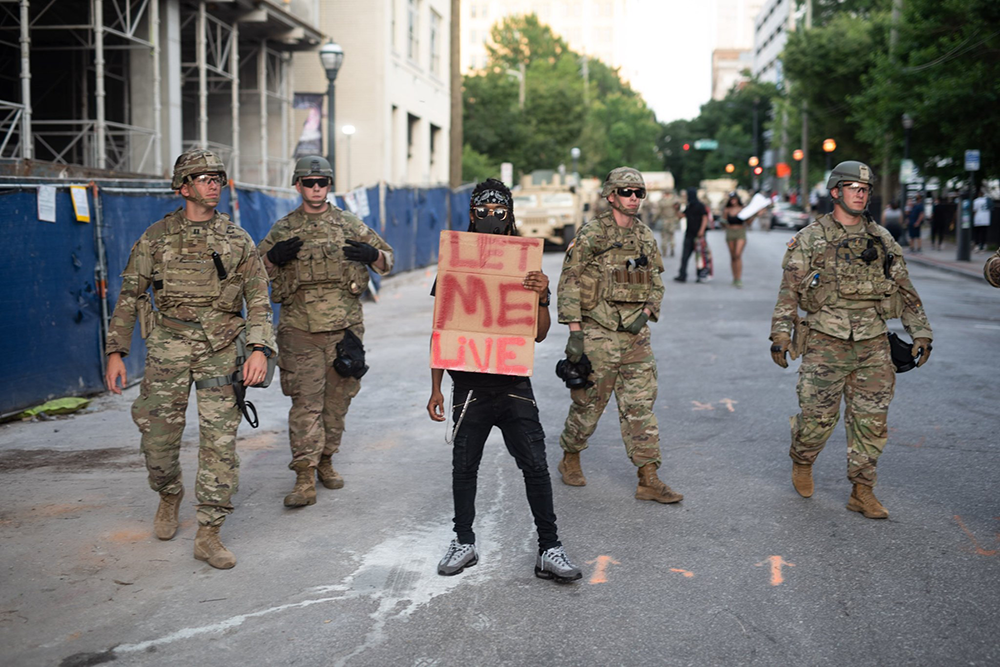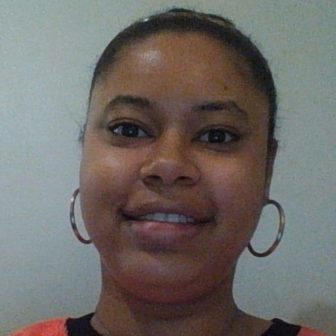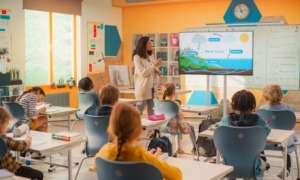
Luke Crawford
Protestor standing with National Guard at Centennial Olympic Park in downtown Atlanta on June 3.
In the midst of me gathering information and doing interviews for this column this past week, a horrific event took place in our country. On May 25, George Floyd, a 46-year-old black man, died in Minneapolis after a police officer knelt on his neck for nearly nine minutes. Derek Chauvin, the Minneapolis police officer who many believe is responsible for Floyd’s death, was caught on videotape restraining Floyd this way.
When the video, coming weeks after the murder of Ahmaud Arbery, went viral, people all over the world were outraged. For many, this was the last straw, and protests that often turned into riots and looting ensued. This event, which appears to be racially motivated, has protesters in all 50 states calling for Chauvin to receive the maximum charge and punishment by law.

Deandra Mouzon
Chauvin, who was initially fired after the incident, was finally arrested and charged with second-degree murder, but for many Americans this is not enough. Even in the middle of a global pandemic, people are coming out with their face masks and signs to stand in solidarity with Floyd’s grieving family. In a country where racial discrimination that often leads to violence is commonplace, thousands and thousands of protestors across the country are taking a stand to say that in 2020 it will not be tolerated.
It has been over 60 years since the civil rights movement began to advocate for racial justice and equality in this country, yet in 2020 we are seeing not only racial disparities and disenfranchisement for black people, but also outright racism to the point of murder, still.
As a black woman who has experienced racism firsthand, I can tell you it is scary to know that there are still people in this world who believe that black people are less than human because we have darker skin than they do. My former college professor, Danny Shaw, is calling these protests the American Spring, and I have to agree.
One factor that has been on my mind is the impact these mass gatherings are having on the spread of COVID-19. People are coming out in the thousands, not only in America, but around the world, despite the advice of experts who still say it is important to continue social distancing. To me, it is a double-edged sword: People are fighting for human rights at the risk of spreading a virus that has been known to take lives itself.
Another factor I thought about is how the riots and looting are going to affect the already suffering economy. Since the country has been on lockdown due to the threat of COVID-19, the American economy and job markets have been negatively impacted. While we watch things unravel I think it is important to look out for the effects that these demonstrations and coordinated sit-outs have on the economy at large.
The government is currently taking steps to quell the protests and riots. Along with tear gas and rubber bullets, some states have deployed the National Guard to make sure the protests remain peaceful. In my opinion, this country will not see peace until all four officers involved in the case are brought to justice.
For Americans who responded after watching the video of a man screaming, “I can’t breathe” while a police officer continued to use excessive force, black lives do matter. You may or may not agree with the way protestors have responded, but I think it has to be said that the villainizing of black people by law enforcement in this country has to end.
This tragic event should not have been the beginning of the conversation, but it has become the catalyst for a necessary change in the way black people are viewed in our communities. I hope that as a country we can finally move toward equality and fairness for people of all races and ethnic backgrounds.
If you would like to contribute to this column and share your story about life during quarantine with a disabled youth, email me at Deandra@csjournalism.org.
Deandra Mouzon is a Georgia-based journalist who received a B.A. in journalism from CUNY’s York College. Currently she is working on a publication about youth with disabilities.



























